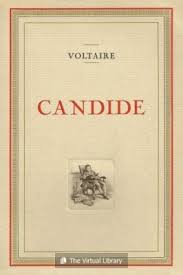Candide Page #3
Candide, ou l'Optimisme, is a French satire first published in 1759 by Voltaire, a philosopher of the Age of Enlightenment.
"She is dead," replied the other. Candide fainted at this word; his friend recalled his senses with a little bad vinegar which he found by chance in the stable. Candide reopened his eyes. "Cunegonde is dead! Ah, best of worlds, where art thou? But of what illness did she die? Was it not for grief, upon seeing her father kick me out of his magnificent castle?" "No," said Pangloss, "she was ripped open by the Bulgarian soldiers, after having been violated by many; they broke the Baron's head for attempting to defend her; my lady, her mother, was cut in pieces; my poor pupil was served just in the same manner as his sister; and as for the castle, they have not left one stone upon another, not a barn, nor a sheep, nor a duck, nor a tree; but we have had our revenge, for the Abares have done the very same thing to a neighbouring barony, which belonged to a Bulgarian lord." At this discourse Candide fainted again; but coming to himself, and having said all that it became him to say, inquired into the cause and effect, as well as into the sufficient reason that had reduced Pangloss to so miserable a plight. "Alas!" said the other, "it was love; love, the comfort of the human species, the preserver of the universe, the soul of all sensible beings, love, tender love." "Alas!" said Candide, "I know this love, that sovereign of hearts, that soul of our souls; yet it never cost me more than a kiss and twenty kicks on the backside. How could this beautiful cause produce in you an effect so abominable?" Pangloss made answer in these terms: "Oh, my dear Candide, you remember Paquette, that pretty wench who waited on our noble Baroness; in her arms I tasted the delights of paradise, which produced in me those hell torments with which you see me devoured; she was infected with them, she is perhaps dead of them. This present Paquette received of a learned Grey Friar, who had traced it to its source; he had had it of an old countess, who had received it from a cavalry captain, who owed it to a marchioness, who took it from a page, who had received it from a Jesuit, who when a novice had it in a direct line from one of the companions of Christopher Columbus.[3] For my part I shall give it to nobody, I am dying." "Oh, Pangloss!" cried Candide, "what a strange genealogy! Is not the Devil the original stock of it?" "Not at all," replied this great man, "it was a thing unavoidable, a necessary ingredient in the best of worlds; for if Columbus had not in an island of America caught this disease, which contaminates the source of life, frequently even hinders generation, and which is evidently opposed to the great end of nature, we should have neither chocolate nor cochineal. We are also to observe that upon our continent, this distemper is like religious controversy, confined to a particular spot. The Turks, the Indians, the Persians, the Chinese, the Siamese, the Japanese, know nothing of it; but there is a sufficient reason for believing that they will know it in their turn in a few centuries. In the meantime, it has made marvellous progress among us, especially in those great armies composed of honest well-disciplined hirelings, who decide the destiny of states; for we may safely affirm that when an army of thirty thousand men fights another of an equal number, there are about twenty thousand of them p-x-d on each side." "Well, this is wonderful!" said Candide, "but you must get cured." "Alas! how can I?" said Pangloss, "I have not a farthing, my friend, and all over the globe there is no letting of blood or taking a glister, without paying, or somebody paying for you." These last words determined Candide; he went and flung himself at the feet of the charitable Anabaptist James, and gave him so touching a picture of the state to which his friend was reduced, that the good man did not scruple to take Dr. Pangloss into his house, and had him cured at his expense. In the cure Pangloss lost only an eye and an ear. He wrote well, and knew arithmetic perfectly. The Anabaptist James made him his bookkeeper. At the end of two months, being obliged to go to Lisbon about some mercantile affairs, he took the two philosophers with him in his ship. Pangloss explained to him how everything was so constituted that it could not be better. James was not of this opinion. "It is more likely," said he, "mankind have a little corrupted nature, for they were not born wolves, and they have become wolves; God has given them neither cannon of four-and-twenty pounders, nor bayonets; and yet they have made cannon and bayonets to destroy one another. Into this account I might throw not only bankrupts, but Justice which seizes on the effects of bankrupts to cheat the creditors." "All this was indispensable," replied the one-eyed doctor, "for private misfortunes make the general good, so that the more private misfortunes there are the greater is the general good." While he reasoned, the sky darkened, the winds blew from the four quarters, and the ship was assailed by a most terrible tempest within sight of the port of Lisbon. V TEMPEST, SHIPWRECK, EARTHQUAKE, AND WHAT BECAME OF DOCTOR PANGLOSS, CANDIDE, AND JAMES THE ANABAPTIST. Half dead of that inconceivable anguish which the rolling of a ship produces, one-half of the passengers were not even sensible of the danger. The other half shrieked and prayed. The sheets were rent, the masts broken, the vessel gaped. Work who would, no one heard, no one commanded. The Anabaptist being upon deck bore a hand; when a brutish sailor struck him roughly and laid him sprawling; but with the violence of the blow he himself tumbled head foremost overboard, and stuck upon a piece of the broken mast. Honest James ran to his assistance, hauled him up, and from the effort he made was precipitated into the sea in sight of the sailor, who left him to perish, without deigning to look at him. Candide drew near and saw his benefactor, who rose above the water one moment and was then swallowed up for ever. He was just going to jump after him, but was prevented by the philosopher Pangloss, who demonstrated to him that the Bay of Lisbon had been made on purpose for the Anabaptist to be drowned. While he was proving this à priori, the ship foundered; all perished except Pangloss, Candide, and that brutal sailor who had drowned the good Anabaptist. The villain swam safely to the shore, while Pangloss and Candide were borne thither upon a plank. As soon as they recovered themselves a little they walked toward Lisbon. They had some money left, with which they hoped to save themselves from starving, after they had escaped drowning. Scarcely had they reached the city, lamenting the death of their benefactor, when they felt the earth tremble under their feet. The sea swelled and foamed in the harbour, and beat to pieces the vessels riding at anchor. Whirlwinds of fire and ashes covered the streets and public places; houses fell, roofs were flung upon the pavements, and the pavements were scattered. Thirty thousand inhabitants of all ages and sexes were crushed under the ruins.[4] The sailor, whistling and swearing, said there was booty to be gained here.
Translation
Translate and read this book in other languages:
Select another language:
- - Select -
- 简体中文 (Chinese - Simplified)
- 繁體中文 (Chinese - Traditional)
- Español (Spanish)
- Esperanto (Esperanto)
- 日本語 (Japanese)
- Português (Portuguese)
- Deutsch (German)
- العربية (Arabic)
- Français (French)
- Русский (Russian)
- ಕನ್ನಡ (Kannada)
- 한국어 (Korean)
- עברית (Hebrew)
- Gaeilge (Irish)
- Українська (Ukrainian)
- اردو (Urdu)
- Magyar (Hungarian)
- मानक हिन्दी (Hindi)
- Indonesia (Indonesian)
- Italiano (Italian)
- தமிழ் (Tamil)
- Türkçe (Turkish)
- తెలుగు (Telugu)
- ภาษาไทย (Thai)
- Tiếng Việt (Vietnamese)
- Čeština (Czech)
- Polski (Polish)
- Bahasa Indonesia (Indonesian)
- Românește (Romanian)
- Nederlands (Dutch)
- Ελληνικά (Greek)
- Latinum (Latin)
- Svenska (Swedish)
- Dansk (Danish)
- Suomi (Finnish)
- فارسی (Persian)
- ייִדיש (Yiddish)
- հայերեն (Armenian)
- Norsk (Norwegian)
- English (English)
Citation
Use the citation below to add this book to your bibliography:
Style:MLAChicagoAPA
"Candide Books." Literature.com. STANDS4 LLC, 2025. Web. 21 Jan. 2025. <https://www.literature.com/book/candide_25>.




Discuss this Candide book with the community:
Report Comment
We're doing our best to make sure our content is useful, accurate and safe.
If by any chance you spot an inappropriate comment while navigating through our website please use this form to let us know, and we'll take care of it shortly.
Attachment
You need to be logged in to favorite.
Log In